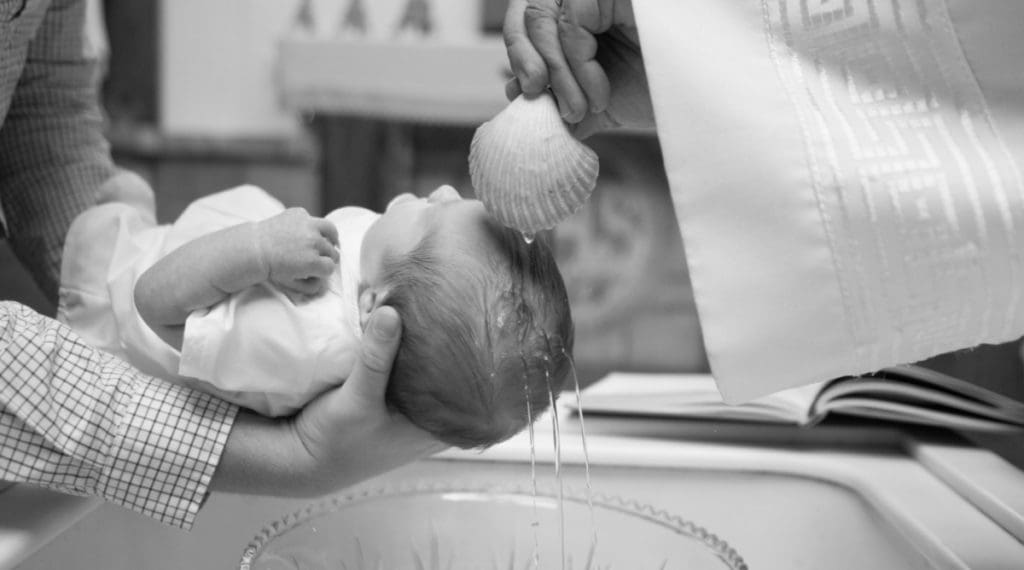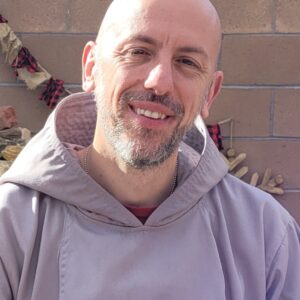What Ryan was experiencing is referred to in both theology and spirituality as the Divine Indwelling, God’s presence in the soul. Because this reality of the Divine Indwelling is so incredible and life-changing, it’s worth asking: How did this happen to us? How did God get this close? When did God, in a sense, move in with us?
Contrary to what many people today might believe, especially because of the influence of the New Age movement, the Divine Indwelling, God’s presence within the soul, is not something that every person possesses. According to Catholic theology, God does not dwell inside every human being. On a natural level, God is present to, knows, and loves every person that exists. Nonetheless, we are not called to merely have a natural relationship with God but a supernatural relationship with Him. How, then, does a supernatural relationship with God occur? Something must happen to us, something that is beyond us but occurs within us.
That something is baptism.
In the Gospel of John Jesus says to Nicodemus, “Truly, truly, I say to you, unless one is born anew, he cannot see the kingdom of God.” Nicodemus responds to these mysterious words of Jesus with an obvious follow-up question. “How can a man be born when he is old? Can he enter a second time into his mother’s womb and be born?’ Jesus answered, “Truly, truly, I say to you, unless one is born of water and the Spirit, he cannot enter the kingdom of God” (John 3:3:5).
Nicodemus is “a ruler of the Jews” (John 3:1) and “a teacher of Israel” (John 3:10), and his interpretation of Jesus’ words is that there must be a physical rebirth to both see and enter the Kingdom of God. This is the natural understanding of Jesus’ words. However, Jesus does not demand a physical rebirth but a spiritual one. How can this spiritual rebirth occur?
The entire tradition of the Church from its earliest days until the present, following the teachings of Jesus, proclaims that the only way this spiritual rebirth can occur is through Baptism. Why? Because it is through Baptism, and only through Baptism, that this dramatic and beautiful upgrade in one’s relationship with God occurs, where we essentially move from being known and loved by God to becoming children of God by adoption (Rms 8:15, John 1:12) and in turn receiving God’s Trinitarian life and presence in the depths of our souls. In other words, it is through Baptism, and only through Baptism, where and how we receive the Divine Indwelling and where our relationship with God moves from the purely natural to the spiritual.
St. Paul alludes to this in his letter to the Corinthians when he says, “Do you not know that your body is a temple of the Holy Spirit within you, which you have from God? ” This will lead St. Paul to remind the Corinthians–and us–“You are not your own” (1 Corinthians 6:19).
Why are you and I not our own? Because God lives inside of us!
In summary, to not only be known and loved by God, but to become a child of God, and to have The Holy Trinity dwelling within us, we must be born again through baptism. However, receiving the sacrament of Baptism is not enough either. The sacraments are not magic. To receive and experience the grace of all the sacraments a person must be receptive to the grace they intend to communicate. Hence, to experience the reality of Baptism and all its fruits, including the Divine Indwelling, one must live out their baptism as fully and as deeply as possible. The reason for this is simple: holiness does not occur by accident or osmosis, but by participation, by our consciously choosing and being receptive to the things of God and living in a Godly way.
The sacraments are not magic.
There are many truths one can glean from this teaching. The most important, I believe, is that it powerfully reveals to us the incredible mercy of God. Because of original sin, we enter the world scattered, afraid, and lost, and through Baptism, God rescues us and draws us to Him. God, through no merit of our own, takes up residence within us, so we don’t have to waste time looking “out there” for Him, wondering, Where is God?
A remarkable passage in The Spiritual Canticle by St. John of the Cross confirms everything we have been reflecting on thus far. St. John of the Cross is writing to someone who appears to be suffering from spiritual darkness, dryness, and confusion in her relationship with God. This person can’t seem to “find” God in her life and is asking the saint where is God? This is a question to which every human being can relate. It is one we may have asked many times.
St. John answers her in this way: “Oh, then, soul, most beautiful among all creatures, so anxious to know the dwelling place of your Beloved so you may go in search of him and be united with him, now we are telling you that you yourself are his dwelling and his secret inner room and hiding place. There is reason for you to be elated and joyful in seeing that all your good and hope is so close as to be within you, or better, that you cannot be without him.”[1]
When this person reveals to St. John of the Cross the distress she is experiencing because God seems to have disappeared from her life and she asks him where God is, he responds by reminding her that God is within. Furthermore, he wants to assure her that God could never disappear from her life because she, through the gift of the Divine Indwelling, is God’s home and dwelling and therefore it is impossible for her to be without Him. Therefore, there is never anything to be afraid of, because no matter what we may feel, think, or be experiencing, God is not only with us but within us.
[1] The Collected Works of St. John of the Cross: The Spiritual Canticle (Washington, DC: Institute of Carmelite Studies, 1991),480.
______________________________________________
Image courtesy of Unsplash.




